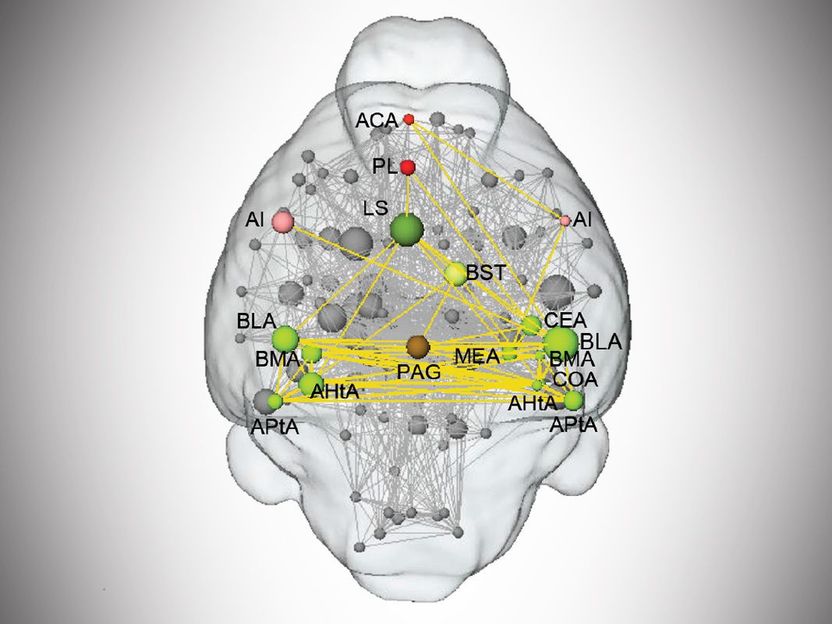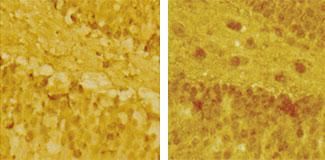Scientists discover “brain hot spot” for drugs against fear
Findings could lead to a new therapeutic approach
The ways in which psychiatric drugs work on the level of neural networks are not yet fully understood. A team of scientists led by Dr. Wulf Haubensak at the Research Institute of Molecular Pathology (IMP) in Vienna and Prof. Dr. Andreas Hess at FAU, have now identified a neuronal circuit in the brain that plays an important role in anxiety and demonstrated how common psychiatric medication acts on it.

The discovery of a neuronal hot spot in the brain controlling fear opens new opportunities for drug development.
IMP
Anxiety disorders are a major medical problem affecting a large section of the population. These disorders can be treated with a range of psychiatric drugs, including a group of substances called benzodiazepines (BZDs). BZDs have been used to treat patients with anxiety for 50 years and what they do on the molecular and cellular level is well understood. However, doctors and neuroscientists still know little about the neural circuit interactions through which BZDs unfold their anxiety-relieving effect.
A team of scientists led by Dr. Wulf Haubensak of the IMP and Prof. Dr. Andreas Hess at FAU has now used a combination of innovative methods linking genetics, information on neuronal circuits and functional brain mapping. They found that BZDs interfere with the relay of aversive signals through the amygdala and characterised the circuits involved.
“Fear emerges from the interaction of several circuits across the brain. In this network, we identified a crucial biomedical ‘hot spot’ that provides the starting point for fear-relieving therapy”, says Dr. Wulf Haubensak. “Tracking down this hot spot has only become possible by combining insights on the connections of neurons in the brain, the connectome, with genetic techniques that allow the functional visualisation and manipulation of specific populations of neurons in living animals – methods and information that have become available only very recently.”
The scientists used mice for their experiments, but by comparing their findings to the functional brain scans of humans, they found clues that the same mechanisms are present in people. This opens new opportunities for drug development.
Prof. Andreas Hess, co-author of the study, emphasised the importance of functional brain imaging. “Non-invasive imaging techniques such as magnetic resonance imaging are key to studying neurobiological functions at the whole brain level. We combined this with novel data analysis strategies to identify the modulatory impact of small neuronal circuits that constitutes an important brain function – in this case anxiety. “Since we know the exact networks of neurons that mediate the BZD anxiolytic effect, we can now try to target them specifically. This may allow the development of new drugs that treat anxiety without the side effects common to current anxiolytics”, says Johannes Griessner, doctoral candidate and first author of the study. He concludes with a broader outlook on how the findings could be used in further studies: “Psychiatry needs a strong biological basis which allows for targeted therapeutic interventions. Our approach could serve as a blueprint for an experimental strategy that could be used to better characterise the effects of psychoactive drugs in general.”
Original publication
Most read news
Original publication
Johannes Griessner et al.; "Central amygdala circuit dynamics underlying the benzodiazepine anxiolytic effect"; Molecular Psychiatry; 2018
Topics
Organizations
Other news from the department science

Get the life science industry in your inbox
By submitting this form you agree that LUMITOS AG will send you the newsletter(s) selected above by email. Your data will not be passed on to third parties. Your data will be stored and processed in accordance with our data protection regulations. LUMITOS may contact you by email for the purpose of advertising or market and opinion surveys. You can revoke your consent at any time without giving reasons to LUMITOS AG, Ernst-Augustin-Str. 2, 12489 Berlin, Germany or by e-mail at revoke@lumitos.com with effect for the future. In addition, each email contains a link to unsubscribe from the corresponding newsletter.
Most read news
More news from our other portals
Last viewed contents

Extreme DNA resolution: Researchers slow down and scan multiple times individual DNA molecules - Researchers have achieved near-perfect control over the manipulation of individual molecules, allowing them to be identified and characterized with unprecedented precision
Analytical trick accelerates protein studies
Peripheral_chemoreceptors

Windows of brain plasticity may help stress-related disorders
Jan_Evangelista_Purkyně

Verder Group acquires ERWEKA - With this acquisition, Verder Scientific expands its portfolio to include dissolution and tablet testing equipment for the pharmaceutical and life science sectors
Sanofi to acquire Bioverativ for $11.6 billion
AIDS.gov
Breaching the blood-brain barrier to create powerful new tools for fighting cancer - Researchers at Rensselaer Polytechnic Institute are developing new technology for pushing drugs through the blood-brain barrier, directly targeting brain tumors
Beckman Coulter, Inc. Obtains CLIA Certificate, Licensure for Clinical Sequencing
ArGEN-X appoints Dr Debbie Allen as Senior Director Business Development






















































